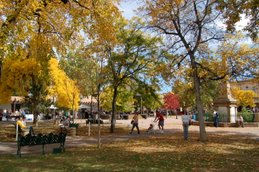Westside Stalemate Ending This Summer ?
The stalemate between buyers & sellers is almost 2 years old now. Will the second summer selling season force the hand of sellers? Or will buyers be enticed by the low interest rates and jump back in? I would imagine there will be a small spring bounce of weak handed buyers and the media will proclaim the bottom is in for housing. Only to see that in fact, it is a "dead cat bounce". Just like the sucker rally in the stock market. The Westside market is stuck for a number of reasons and is quite different than the lower end market receiving all the positive news lately. HELOC abuse, Alt-A, Option ARMs and Prime loan resets in combination with underwater sellers, tilts in favor of buyers this summer. With all the negative headwinds still unresolved, the Westside, down about 25% from 2007, will drop another 15% by September. Eventually, it should bottom out at over 50% off during the next couple years. By 2012, we drag along the bottom for a few more years, until all the excess inventory and inflated prices are worked off.
By the end of summer, buyers will be nibbling at prices that are 40-50% off, depending on the location. Time is on the side of buyers, as 2005 - 2007 sellers are upside down, with 2003-2004 sellers close behind.




























26 comments:
Besides a bunch of bloggers claiming the westside loans are based on Alt-As and Option ARMs that are about to reset, does anyone have actual data that supports this assertion? If so, please provide. Thanks.
If people have not seen the data and are speculating, then it seems like everyone is just engaging in wishfull thinking.
why do you think wfc must raise $15B???
or ask these people to run the area you're interested in (pricing starts at $2,500 for their reports, i think):
"http://www.loanperformance.com/aboutus/contact_us.aspx"
WFC raising $ 15 B doesn't prove anything about the west side resets.
Thanks for the link but I'm not interested in paying $ 2,500 to satisfy a curiosity. I'm sure most of the bloggers predicting the meltdown did not fork over the money.
Just the same, I would like to see the data bloggers are using to predict the Alt-A and Option ARM resets in the West Side. If they are not using data, that speaks volumes about the quality of their predictions.
Agreed, Anonymous 8:19PM -- I keep hearing all these numbers thrown around, but shopping for a house on the Westside, I'm seeing the good candidates snapped up in days at full or over price. Where are the numbers supporting the notion that Westsiders saturated themselves in ARMs and Alt-As? I'd love to believe it, but I'm highly skeptical...
First of all, the 90402 blog never got the traffic it deserved. fold it back in here
I for one really believe there are tons of people in the 90402 who are about to default. Wave of foreclosures is coming
I have to admit the evidence for my point of view is thin. One data point right now - some big money people got in a bidding war for a house in the 90402 and it sold for more than ten million bucks. I was holding my breath but it cleared escrow.
I completely agree -- I have asked for data/proof/evidence of this massive resetting of Alt-As on the westside several times. LateSummer, you have never responded. others are asking as well. That claim has been made on this blog and others for over a year now.
But one thing that is sure. People continue to buy in Venice, even though the schools are bad, crime is high, and as part of LA city services, you wait forever for police response to emergency calls. Check this blog below.
http://www.yovenice.com/forum/politics-community/house-robberies-on-santa-clara-and-san-juan/page-1/post-1213/#p1213
yes
the violent NAM types are all over Venice
At least I can understand people seeking the tranquility of PP and paying up
but WTF is up with 2 million dollar houses in Venice?
Latesummer2009,
Your silence on the data issue is deafening.
I wish you are right on the resets but it appears your predictions are not grounded on hard factual data.
I have no idea what types of loans they got, but I know two families in Brentwood who are in financial trouble. One is surviving on savings and the other is self employed and business has dropped about 15%, but they are maxed out and hurting. There is a thrid family whose home is in escrow, they are very high end, paid cash and their buyers have cash so they expect to close. Not everyone is in trouble, but I am sure plenty are. The people I know in 90402 who are doing well bought pre-bubble and are long term.
I think it is just a matter of time and all the bulls will be surprised when things finally come down. If homes are getting snapped up so fast, why are there not more closing?
Anonymous 2:33PM, I really hope you're right. But the more well-heeled folks I know who are experiencing financial difficulties are far more capable of holding on to their homes through lines of credit, etc. than those in harder hit areas. I know people in trouble too -- TV writing ain't the gold mine it used to be -- but these folks by and large have excellent credit and access to cash -- enough to hold on for another year or so at least.
Look, I'd love to believe the numbers I see tossed around on pages like these. I'm a buyer. I'm not attacking LateSummer, and I'm sure I know less about it than most people. I just see very little real-world, on-the-street evidence of the Westside apocalypse predicted here, and would love to see the claims shored up with quantifiable figures. That's all.
Kvetch, kvetch, kvetch. So many want the work done for them, the data handed to them on a silver platter. If you don't want to shell out that $2,500, then do some research yourself:
1. Decide on an area and home that you particularly like, find it on the LA County Assessor web site. There will be a tab there for recent sales in that home's particular area. Some of the sales go back several years. Pick a couple from 2006/2007.
2. Now go to Property Shark and look up some of those addresses. Betcha find homes that were financed 100 percent, no skin in the game. Betcha find quite a few with variable rate mortgages getting ready to reset later this year and next.
3. Betcha won't be surprised these homes start coming on the market soon == with prices lower than right now.
I did this late last year for some choice streets in my area, and now they're appearing as NODs, NTSs, REOs. It's quite something, and it's just starting on the westside. It can happen here -- not just Riverside and Palmdale anymore.
We seem to have struck a nerve here. That's good.
First of all, I don't pretend to have all the answers. And, I'm not about to spend $2500 on loan information to find out. Let's use a little common sense here though.
1)The Alt-A and Prime Loan markets by far, dwarf the Subprime market. Subprime was the first segment of the Real Estate market to go sour. It's makes sense, that those are the properties to have corrected 50% or more first.
2)Loan standards obviously have gotten and will get more stringent from here on out, with new government regulationscoming down the pipeline. This will affect who can get loans and for how much. In the "Bubble Years" of this decade, anyone with a pulse could get a loan. Those days are over. Say goodbye to speculation, which was a huge part of the market on the Westside. Nothing else can justify current prices, if you look at the fundamentals.
3)The Alt-A and Prime Loans written during this decade usualy typically recast after 5 years OR when the Loan to Value reaches 110%. This is important because the loans can reset much earlier than 5 years, as originally scheduled. And, when they reset, the teaser payment ends and thepayment includes BOTH principal AND interest, which increases their payments substantially. Good luck trying to get that loan refinanced. Unless you had put a large chunk down, you are screwed. With prices continuing to drop, why would anyone keep paying on a losing proposition. If you think that Westside Buyers didn't take out these types of loans, your kidding yourself. Not everyone on the Westisde is sitting on a pile of cash. And, if they are, that pile is shrinking as the economy deleverages.
4) HELOCs are another disaster waiting to happen. Many buyers got into homes with little or no money down and began using the ol' House ATM to finance a lifestyle they couldn't afford. I have heard the horror stories in affluent areas of people owing twice as much as their homes is worth due to HELOCs. They were probably used used to buy more real estate, compounding their problems. The banks were totally irresponsible in writing tons of thes HELOCs, placing many underwater.
5)The job situation is not getting better. 600,000 jobs lost each month has to have an effect on the pool of buyers availableto buy real estate. Plus, business are shutting down everywhere, despite the "sucker rally" on Wall Street. This will have a serious effect on the Westside this summer.
6) As for the 90402. If prices are off 25%, how come people aren't rushing into buy everything that's on the market? Why, because 90402 is lagging the rest of the market, and it's time is coming. I certainly haven't seen many new projects starting at these "bargain" prices. That's because it's still overpriced. Starters around 1.7 Million are selling to people who want to "live" in the area and not speculators. The rest is just sitting, when we should have more activity.
7)Lastly, Venice. INMHO this has to be the most overpriced area in Los Angeles. Why someone would pay up to 2 million for a house on a sliver lot, with serious parking, crime and homeless problems is beyond me. Not to mention being served by the City of Los Angeles which is losing revenue and affecting police, fire and schools. Just because it is "trendy" doesn't make it a good investment. It stands to lose the most value of any area in LA. On a side note, most of Venice is subject to severe liquefaction in the event of an earthquake. I wonder how many have earthquake insurance?
I guess time will tell this summer and we will see who wins this tug of war. Remember, buyers can always wait, whereas sell may not have that option.
I am Anon 2:33
You are right about people in Brentwood and 90402 holding on longer and having more reserves. Nonetheless this just makes prices sticky, they cannot go in the hole every month indefinitely. The one family is in a world of hurt right now, the other I think has more reserve, but the husband has been unemployed for months. He is in investment banking.
Years ago I remember my husband saying to me with some surprise, "No matter how much I make if I spend more than I take in, I go in the hole." He is a perfectly sharp guy, but did not learn about finances as a child as his parents just handed out money as is typical of my generation. The only reason we did so well is that I handled the money. Now he is very good, but in the early years he figured if he was making a lot he could spend a lot. He did not see it as an opportunity to save like crazy and aquire some freedom.
I remember living in Silicon Valley and seeing highflying high tech people lose everything after just a month or two out of work. These people had earned millions and spent it all. We see this with movie starts and athletes all the time. High incomes are no indication of money management savvy.
In any given neighborhood be it high end or low, there is no way of knowing just by looking which households are living within their means and which are a house of cards.
Years ago when we were living in Bellevue, WA I remember thinking the people I knew all had husbands who made more than mine. As time went on I found out that several made half what mine was taking in, they just spent more and had debt. We are talking in their 30's with professional incomes and still paying student debt, car debt, credit card debt and not in a house yet. There was another couple I knew where the husband was a perinatologist and one of the best in the state if not the best. They were in their mid 50's and had no started saving for retirement yet.
Until we see a majoyr psycholigical shift toward more thrift, this fiancial pain will not be over.
Kvetch, kvetch, kvetch,
Garbage in and Garbage out.
The data derived from your suggested process is not good enough to determine resets for the westside. What is needed is a more comprehensive set of data that shows most, if not all the transactions on the westside.
LateSummer2009,
I agree with your logic on the Option ARM and Alt-A resets. However, for all we know, a majority of those loan types maybe outside the Westside.
When I initially wrote the 1st comment above, my goal was to determine the quality of your forecast under "Westside Stalemate Ending This Summer?". I have my answer.
Even though I don't think the quality of your forecast is strong, I hope you're right. I'd like to see housing costs come down to reality.
check out Dr. Housing Bubble for statistics. Read past posts from this year. You will get your hard facts. Also, Calculated Risk does a good job.
Wow all I hear is doom and gloom heree while the winners of our society fight each other to write a ten million dollar check for a house in the coveted 90402 zip code
yes there are plenty of people in trouble but admit for a minute that there are still some heavy hitters desperate and hungry for the 90402
From the 2007 Credit Suisse report that produced the famous ARM reset schedule:
In 2006 70% of all mortgages in LA had less than 20% down, and 55% of those had less than 5% down. It doesn't break it into different areas, but no way the westside is different. And prices have fallen far more than 20% so there is serious negative equity in those 2006 sales.
40% of those 2006 LA sales were interest-only ARMs, so when those reset they all will be in default and incapable of loan modification because their loan-to-value ratio will be over the maximum.
And if similar stats apply to 2004, 2005, and 2007 years it is impossible for a bottom to be in right now.
I'd be curious to know if anyone on this board bought or sold a house in 2005-2007 time frame? I ask because it seems as though there is some fundamental real world experience missing. First of all, if you were selling in those boom times and received multiple offers - you aren't taking the no money down one. The higher the down payment, the more likely the close. Zero down over bids are too risky to sellers. Additionally, very few people bought high end homes with more than 1.5 million financed. This means most LTVs are still low enough to be able to refinance if the owner is worried about loan resets (which would actually lower payments based on current rates for many people.) Lastly, the first 10 years of traditional loans are virtually interest only anyway - which is why banks offered these. Adding principal payments to the monthly is simply not that big a deal. Put me into the camp that thinks mass defaults is simply wishful thinking.
As the Calculated Risk blog stated today, "the rapidly rising defaults for Alt-A (and HELOCs and Jumbo Prime) loans will impact house prices in neighborhoods where the loans are concentrated (mostly mid-to-high end areas)." The odds are that there were a good many of the loans on the Westside were Alt-A. What subprime was to the inland areas, the coming crisis will likely be to the mid and upper end.
Furthermore, recasts are the issue, not resets. Many of these loans were interest-only or even partial-interest-only. When they recast (after 3-5 years on average), payments often double - even when interest rates are lower - due to amortization of the remaining loan balance (in other words, payments increase to include full interest plus principal).
But the focus on the loan recasts is a bit misleading in any case. The waves of recasts will serve as an accelerant, speeding up the downward trend in pricing, but they are not in themselves the root cause of the price collapse.
The truth is that prices are falling because the bubble popped, it's as simple as that. There is no reason for prices to remain at bubble-inflated levels. Bubbles occur when prices diverge from trend levels (determined by actual market forces) due to "irrational exuberance" or bubble mania.
In the case of the tech bubble, the price to earnings ratio inflated well beyond anything that made sense. In the real estate bubble, the prices lost touch with both income and rental costs. Once the bubble mania subsides and market forces once again prevail, prices invariably come back down to trend levels, as dictated by real market conditions rather than hysteria.
I have yet to hear a single good reason why the Westside should retain bubble pricing. What I have heard is a lot of emotional venting by people either who stand to lose money from the price declines or who have been priced out for years and are afraid to get their hopes up. I really hope the damage isn't as great as I fear it will be, since my own business could take quite a hit due to any further destruction of wealth and an attendant reduction in consumer spending. However, wishful thinking won't get us anywhere, and until housing finds a true bottom, the economy will continue to flounder.
In any case, we won't have to wait long to see who is right.
Folks -
It's not that tough. According to just about any source you look at, median home prices in SM are still more than 10x median income - roughly $75K and $800K respectively. Think about that - the average person making $75K is buying a house worth more than $750K. Even assuming 20% down (unlikely) on a 30 yr fixed mortgage, that leaves the owner with a payment of $3800/month excluding taxes, insurance and any HOA fees. That's $45,600 and would essentially take care of the owner's entire take home pay. As many of you know, traditional (i.e pre-bubble) measures of affordability would recommend only stretching to the 3-5x range, so we are still massively overpriced relative to historical norms. The only conclusion you can come to is that either there were a lot of exotic loans written during the bubble (no other way to afford the monthly payments, initially), or everyone who bought in the last five years has a lot of family money. Which is the more likely circumstance?
It's really a crazy stalemate out there. when you see what sellers are still listing their homes for...950,000 for a home someone bought 30 years ago for $200,000 and barely updated...It's really frustrating. We made a solid offer on a house that we knew was in and out of pre-foreclosure. Our contractor thought it was a tear-down, but we thought we'd offer a very fair price and put some work into it -- the agent listing says:
"Seller is highly motivated!!!! Submit offers!!" (exact quote) And both times the seller countered our offers with the list price. We're officially sitting on the sidelines until sellers come down to reality!
Thanks for your blog Latesummer2009. I too believe that prices will continue to drop due to the reasons you listed in your May 7, 2009 9:30 PM post. However, I am having trouble reconciling my thoughts about a continued downward pricing trend and on thing:
Banks **are** lending again, and homes on the bottom of the Westside market (i.e., homes listing for between 550K to 600K) have been selling quickly. Granted, I know this from my recent experiences trying to buy a home over the last three months in the Mar Vista, Culver City, MDR areas, and I have no hard data to show other than my agent's report (and we have made offers!). In addition, when I say "selling quickly" I am NOT referring to the (many) properties in tough areas, such as adjacent to the freeway(s) or on busy streets, etc.
Would banks be writing paper for homes if they believed that the home values were still dropping? Say what you will about mortgage lenders' brain power, but I am inclined to think that banks are now (more than ever) going to be very cautious about home loans, and would not be loaning any money if they truly thought home prices might continue to drop as much as 25% from April/May prices.
Please let me know why this phenomenon, that banks are granting mortgages to Weststide home buyers, is not an indicator that the banks think the market has already stabilized.
Thanks again for all your insightful comments!
I agree with the above. We were looking for a 600-700,000 home in the same area to fix up/renovate ourselves. But homes with good bones in decent locations go quickly. If they are on the market for more than 60 days, it's because the location sucks and /or selling price is too high. People are getting FHA loans too.
Ditto x3. Houses are selling. Love the idea that there's a buyer's market coming, but at 500 - 800K, my experience thus far has been otherwise. Better than it was in '05? Sure. But move fast if you want that 3/2 on a tree-lined street in Mar Vista...
yeah, the 600,000- 700,000 range homes are selling in Venice (REOs, teardowns, probate...) But there are many homes coming on the market still priced in the 900,000s -- 2 bedrooms, mostly small lots, horribly outdated homes in Venice, where you can't send your kids to public schools. Anything you could just move into without serious rennovation is still priced at $1 million +. Just doesn't make sense. who is going to buy these homes? when will agents and sellers come down to earth?
Lenders will lend when they believe there is no serious risk of losing money. If they think the house will not drop more than another 20% and the buyer puts down 20% they will take the jump. In addition with better lending standards and higer down payments fewer people will default even with a drop because they don't want to lose their money. This is why low down home loans were so crazy in the first place.
I believe many bankers just like the public are believing all they read about us just popping out of this recession and going back to a new bubble. Either that or they expect to be inflated out of it. I have been amazed at how many people are holding on with the expectation that the real estate market will turn around and start zipping back up in a year or two. Our biggest hurdle here is psychological. Most people are not at all rational about the relationship between incomes and home prices.
Post a Comment